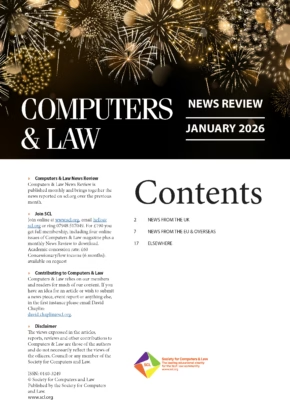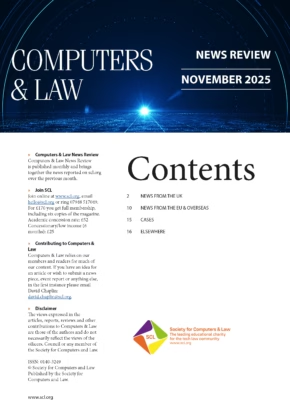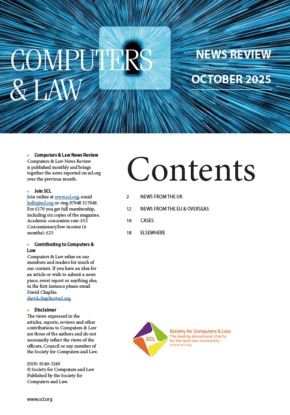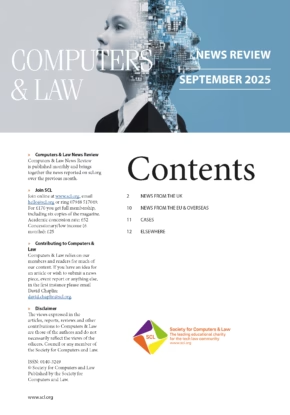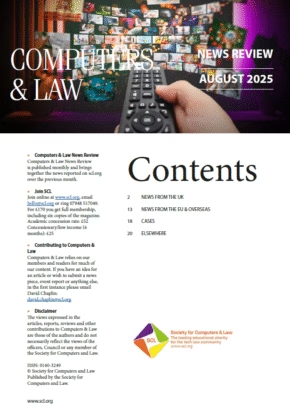Upcoming events
View more >Data Protection Conference 2026
Contracts Update 2026 Online – Part 1 and 2
An evening with Elin Haf Davies
Articles
View more >
Rolling the Dice in the Shadow Realm: Regulatory Challenges of Crypto Casinos
Emma Hewins looks at the regulatory challenges presented by the emergence of crypto casinos. “My ventures are not in one bottom trusted,Nor to one place; nor is my whole estateUpon the fortune of this present year:Therefore my merchandise makes me not sad.”William Shakespeare, The Merchant of Venice Gambling has deep roots, but the modern casino…
Read More… from Rolling the Dice in the Shadow Realm: Regulatory Challenges of Crypto Casinos

Ctrl + Alt + Chaos: How teenage hackers hijack the internet
Fiona Phillips reviews a new book investigating just who is behind the chaos sown by hackers Anyone who works in cybersecurity will be familiar with the enduring stereotype of the teenage boy hunched in a dark bedroom, headphones on, fingers flying, wreaking global havoc between homework assignments. In Ctrl + Alt + Chaos, Joe Tidy…
Read More… from Ctrl + Alt + Chaos: How teenage hackers hijack the internet

Data centres: emerging risks and regulation
As data centres become a critical part of our infrastructure, Peter Dalton, Adil Tirmizi and Sophia Wah review the current risks and regulations around them. Demand for data centres continues to grow globally, driven by increased computing requirements for AI and continued demand for data and connectivity, the trend towards cloud computing and IOT capability….
Attorney-Client Privilege at Risk: The Hidden Danger in Digital Intake Forms
Camilo Artiga-Purcell flags up some of the cybersecurity, data protection and privilege risks associated with client-intake forms. Solicitors and barristers across England and Wales have embraced digital transformation, adopting sophisticated case management systems, e-discovery platforms, and document automation tools. Yet many overlook a critical vulnerability: the web forms used to collect confidential client and prospective…
Read More… from Attorney-Client Privilege at Risk: The Hidden Danger in Digital Intake Forms
Just Published: Computers & Law: Cybersecurity Special Issue
Fiona Phillips, guest editor of our Cybersecurity special issue and chair of the SCL Cybersecurity Group, stresses the importance of cyber for lawyers and for wider society As Chair of the Cybersecurity and Law Committee for the Society for Computers and Law, I am honoured to introduce this special edition devoted to one of the…
Read More… from Just Published: Computers & Law: Cybersecurity Special Issue

The Post Office Horizon IT Scandal: How should organisations react when IT systems go wrong?
Andrew Woolsey and Sophie Ashcroft take a fresh look at the legal issues surrounding defective software through the lens of the Post Office Horizon IT scandal…

Emerging technologies and the climate: charting a pathway to pre-emptive oversight
Once upon a time technologies like artificial intelligence and the metaverse were confined to the annals of science fiction. No longer, both innovations exist in the here and now, with vast potential to transform our world. These emergent technologies, however, are not without attributes of concern, one of which is energy consumption and the consequent…
Read More… from Emerging technologies and the climate: charting a pathway to pre-emptive oversight
Latest replay
View more >-
Member discount

Public Sector Tech Virtual Conference
£240.00 £120.00 (Member price) -
Member discount

Tech Transactions Masterclass
£360.00 £180.00 (Member price) -
Member discount

AI Law: what every business (and their lawyers) needs to know
£600.00 £300.00 (Member price) -
Member discount

Lunch and Learn 3: Digital Transformation in practice – Gaining the edge from drafting
£84.00 £42.00 (Member price) -
Member discount

Digital Media Masterclass: Copyright and Content in the Digital Age- Legal Insights on GenAI and E-Sports.
£240.00 £120.00 (Member price) -
Member discount

Outsourcing: the current shape of the market
£84.00 £42.00 (Member price) -
Member discount

Consent or Pay Webinar
£84.00 £42.00 (Member price) -
Member discount

Digital Transformation in practice – getting to grips with different commercial models
£84.00 £42.00 (Member price)




